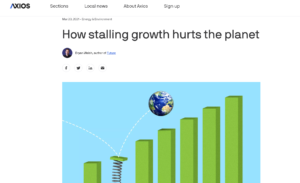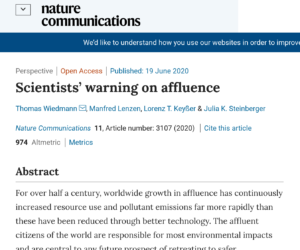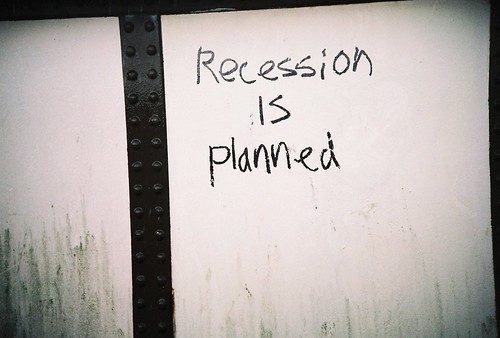Via: https://www.cnbc.com/video/2021/05/20/degrowth-is-it-time-to-live-better-with-less.html
#
Background:
Great Reset By Marc Morano – Chapter 12 Excerpt: ‘COVID Lockdowns Morph to Climate Lockdowns’


Greta Thunberg denounced world leaders for their main focus on what she called “the fairy tale of eternal economic growth.” …Now Europe’s main scientific body, the European Academies Science Advisory Council (which comprises of the National Academies of Science of EU Member States, plus Norway, Switzerland and UK), has followed in Greta’s footsteps, hitting out against policy makers and governments who prioritise economic growth.
“Generation Greta gets it. Our focus should be on well-being and welfare, but our economic system puts all focus on growth and GDP which adds fuel to the climate and biodiversity crises.” That’s how the European Academies Science Advisory Council press release highlights the main take of its report that calls for “‘transformational’ change that is necessary if policy-makers and their public (sic) are to support the conclusions of the advocates of change.” … Tracking happiness could be the key to beating climate change, a group of European scientists has said.
Update: Greenpeace Co-Founder Dr. Patrick Moore responds to study: “How does this garbage get published? I have never seen the forests and wild lands so lush with growth. The CO2 fertilization effect is real, 35% increase in growth, caused by affluence. Can’t we teach them just one thing, that the CO2 we are putting into the atmosphere came from there in the first place? That fossil fuels were made from plants?”
Eric Worrall at WattsUpWithThat: “Central planning, rationing, price controls, punitive wealth taxes and wealth redistribution. The glorious future climate concerned scientists are planning for us.”
#
New study in the journal Nature Communications – June 2020: “The affluent citizens of the world are responsible for most environmental impacts.” Propose “far-reaching lifestyle changes.”
“We provide evidence from the literature that consumption of affluent households worldwide is by far the strongest determinant and the strongest accelerator of increases of global environmental and social impacts.” – “These solution approaches range from reformist to radical ideas, including degrowth, eco-socialism and eco-anarchism.”
Study laments that “low-income groups are rapidly occupying middle- and high-income brackets around the world. This can potentially further exacerbate the impacts of mobility-related consumption, which has been shown to disproportionately increase with income.” – “Affluence needs to be addressed by reducing consumption.”
‘A shift beyond capitalism’: “It is clear that prevailing capitalist, growth-driven economic systems have not only increased affluence since World War II, but have led to enormous increases in inequality, financial instability, resource consumption and environmental pressures on vital earth support systems”
New goal: “Avoid or to reduce consumption until the remaining consumption level falls within planetary boundaries, while fulfilling human needs.” …Avoiding consumption means not consuming certain goods and services, from living space (overly large homes, secondary residences of the wealthy) to oversized vehicles, environmentally damaging and wasteful food, leisure patterns and work patterns involving driving and flying.”
Propose ‘sustainable consumption corridors’, i.e. minimum and maximum consumption standards.’
“Eco-feminist approaches highlight the role of patriarchal social relations and the parallels between the oppression of women and exploitation of nature.” … “Strengthen equality and redistribution through suitable taxation policies, basic income and job guarantees and by setting maximum income levels, expanding public services and rolling back neoliberal reforms (e.g. as part of a Green New Deal).”
‘Setting maximum income levels’: “The transformation of economic systems can be supported with innovative business models that encourage sharing and giving economies, based on cooperation, communities and localised economies instead of competition”
#
Note: The journal Nature likes touting ‘degrowth.’ See:STUDY in Nature in 2018: Global wealth redistribution, economic ‘degrowth’ needed to fight ‘global warming’
Stephen Moore: “The degrowth fad — hopefully it is just that — also reveals the modern left movement for what it is at its core. It is anti-growth, anti-people, anti-free enterprise and anti-prosperity. The entire climate change movement is an assault against cheap and abundant energy and rising living standards. This raises the question of how we could ever rely on the left to fix our economy, help the poor and make us all more prosperous if their goal is to shrink the economy, not grow it?”
“Degrowth” involves a purposeful contraction of the economy
Some climate-focused economists see the COVID-19 pandemic as an unwitting experiment for a radical strategy to reduce global greenhouse gas emissions. The concept is called “degrowth.” It involves a planned slowdown of economic sectors that emit large amounts of global carbon dioxide. Those sectors would scale down until the broader economy meets “sustainable emissions levels,” advancing long-term health and environmental goals.
Natasha Chassagne of the University of Tasmania: There are “opportunities we can take away from the coronavirus emergency.” …
“‘Degrowth’ involves a purposeful contraction of high-emitting sectors while growing other sectors that produce low or zero emissions.”
#
“Economic growth saves children’s lives. That is one of the most basic, starkest facts about the modern world. Second, there is a thing called the “degrowth movement”, which wants to stop economic growth. And, yes, this would lead almost inevitably to the unnecessary deaths of thousands of children a day.”
A team of European researchers led by the University of Leeds published a study in the journal Global Environmental Change – June 29, 2021
“Degrowth… is an idea whose time has come”
Move from “an animal-based to a plant-based diet”
Move from “individual to collective transport”
Move from “motorized to active” (walking and cycling) travel
John Stuart Mill: In 1848, decades into the Industrial Revolution, Mill wrote that “[h]itherto it is questionable if all the mechanical inventions yet made have lightened the day’s toil of any human being. They have enabled a greater population to live the same life of drudgery and imprisonment…”[3]Mill’s answer as to why this was the case was, at its core, Malthusian. The fruits of innovation had not been equally shared, he argued — a few made fortunes, and productivity growth had increased the comforts of the middle classes, but most saw no benefit and would not do so until “the increase of mankind shall be under the deliberate guidance of judicious foresight.”[4]
Marc Morano comments: My new book Green Fraud devotes an entire chapter to how climate activists praise COVID lockdowns and are seeking climate lockdowns and “planned recessions’ and Degrowth to fight global warming.
#

Axios: “The global economy shrank by an estimated 4.3% in 2020, according to data from the World Bank. That contraction was due both to the direct pain of the pandemic and the effects of social distancing measures, but it also led to a roughly 6% reduction in global carbon dioxide emissions — the biggest annual drop since WWII. However accidental, 2020 represented perhaps the best example we’ve ever experienced of degrowthism in action.”
“For degrowthers, simply cleaning up the global economy by switching from fossil fuels to zero-carbon sources of energy isn’t enough. Economic growth — the goal of essentially every government everywhere — is itself the problem.
Environmental activist Greta Thunberg…chastised delegates at a UN climate summit in 2019: “We are in the beginning of a mass extinction, and all you can talk about is money and fairy tales of eternal economic growth. How dare you!”
The movement now has its own dedicated academic journals, associations and conferences.”





